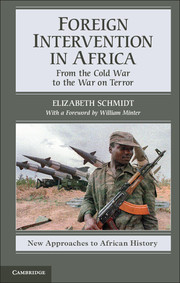Book contents
- Frontmatter
- Contents
- Illustrations
- Acknowledgments
- Foreword
- Abbreviations
- MAP 0.1. Africa, 1947. (Map by Philip Schwartzberg, Meridian Mapping, Minneapolis.)
- MAP 0.2. Africa, 2011. (Map by Philip Schwartzberg, Meridian Mapping, Minneapolis.)
- Introduction
- 1 Nationalism, Decolonization, and the Cold War, 1945–1991
- 2 Egypt and Algeria Radical Nationalism, Nonalignment, and External Intervention in North Africa, 1952–1973
- 3 The Congo Crisis, 1960–1965
- 4 War and Decolonization in Portugal's African Empire, 1961–1975
- 5 White-Minority Rule in Southern Africa, 1960–1990
- 6 Conflict in the Horn, 1952–1993
- 7 France's Private African Domain, 1947–1991
- 8 From the Cold War to the War on Terror, 1991–2010
- Conclusion
- Index
- References
2 - Egypt and Algeria Radical Nationalism, Nonalignment, and External Intervention in North Africa, 1952–1973
Published online by Cambridge University Press: 05 February 2013
- Frontmatter
- Contents
- Illustrations
- Acknowledgments
- Foreword
- Abbreviations
- MAP 0.1. Africa, 1947. (Map by Philip Schwartzberg, Meridian Mapping, Minneapolis.)
- MAP 0.2. Africa, 2011. (Map by Philip Schwartzberg, Meridian Mapping, Minneapolis.)
- Introduction
- 1 Nationalism, Decolonization, and the Cold War, 1945–1991
- 2 Egypt and Algeria Radical Nationalism, Nonalignment, and External Intervention in North Africa, 1952–1973
- 3 The Congo Crisis, 1960–1965
- 4 War and Decolonization in Portugal's African Empire, 1961–1975
- 5 White-Minority Rule in Southern Africa, 1960–1990
- 6 Conflict in the Horn, 1952–1993
- 7 France's Private African Domain, 1947–1991
- 8 From the Cold War to the War on Terror, 1991–2010
- Conclusion
- Index
- References
Summary
American pressure on the old imperial powers began during World War II. In exchange for wartime assistance, the United States sought access to European colonies for raw materials, markets, and military bases. After the war, the United States continued to wave the banner of free trade as it strove to replace France and Britain as the dominant power in Africa and the Middle East. Yet in the Cold War context, Washington was also concerned about maintaining the strength and good will of its NATO allies while pressing for imperial reforms that would thwart the spread of radical nationalism and international communism. In Egypt and the Middle East, radical nationalists challenged the repressive royalist regimes that had remained in power largely as a result of British and American support. In Francophone North Africa, Algerian nationalists waged a war for independence that threatened to disseminate the radical message throughout the region. Although the Soviet Union was anxious to gain a foothold in these Western strongholds, it was not willing to risk war with the United States to do so. It courted radical movements and regimes but also attempted to rein them in, wary of being drawn into conflicts that were not of its own making.
This chapter focuses on foreign intervention in Egypt and Algeria during the period 1952–73, when these countries were central to the political dynamics of North Africa and the Middle East. Events in Egypt and Algeria did not occur in isolation; they were intimately connected to circumstances elsewhere in the region, which was experiencing an upsurge in radical nationalism and regime change. Both countries figured prominently in the 1955 Conference of Asian and African States in Bandung, Indonesia. Refusing to take sides in the Cold War, participants in the Bandung Conference focused their attention on the Southern Hemisphere. They voiced their opposition to all forms of racialism, colonialism, and imperialism, and they pledged support for emancipatory movements throughout the developing world. Egypt played a leading role in the conference, which specifically endorsed the Algerian independence struggle. In the years that followed, Bandung participants formed the core of the intergovernmental Non-Aligned Movement and the nongovernmental Afro-Asian Peoples’ Solidarity Organization, which was headquartered in Cairo. With the addition of Latin American membership in 1966, the latter became the Organization of Solidarity with the Peoples of Asia, Africa, and Latin America.
- Type
- Chapter
- Information
- Foreign Intervention in AfricaFrom the Cold War to the War on Terror, pp. 34 - 55Publisher: Cambridge University PressPrint publication year: 2013



